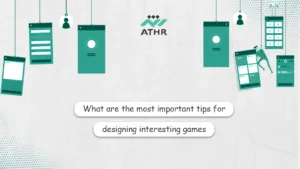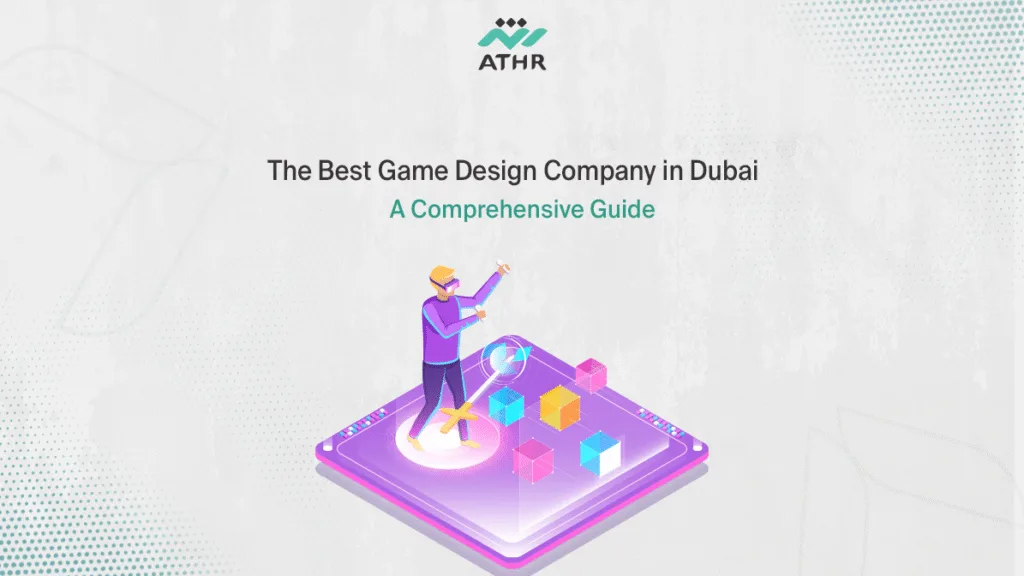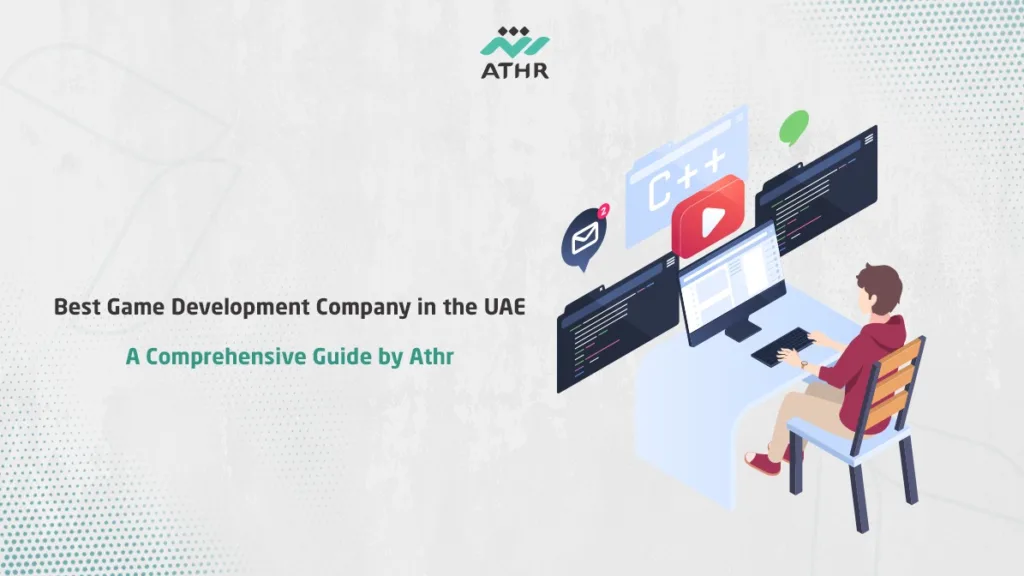Have you ever thought about programming a successful game that captures the attention of players worldwide?
In the fast-evolving world of gaming, success requires more than just a great idea. You need a precise strategy, powerful tools, and a unique experience that keeps players coming back for more.
We will show you the top 10 tips for programming a successful game, helping you design and your game development using the latest technologies and achieve the success you deserve. Get ready to learn everything you need to design your next game!
Start your game development journey now! 📞Contact us for a personalized consultation.
جدول المحتوي
- How to Start Programming a Successful Game in 2025
- 2. The Best Programming Languages for Game Development
- 3. What Are the Most Important Tips for Designing Interesting Games?
- 4. Choosing the Right Game Engine: What’s the Best Option?
- 5. How Can You Improve Game Performance to Attract a Wide Audience?
- 6. Why Should Game Graphics Be Realistic?
- 7. How Do You Ensure Your Game’s Compatibility Across All Platforms?
- 8. How to Use Artificial Intelligence in Video Games?
- 9. How Do You Start Marketing Your Game After Development?
- 10. What Tools Should Every Game Developer Use?
- What are the best ways to program a successful game in 2025?
- How can I start programming a video game from scratch?
- Why is programming a successful game difficult?
- How can the player experience in games be improved?
- What tools are necessary for developing a successful game?
- How do you choose the most suitable game engine for developing your game?
- Can I program a successful game myself, or should I hire a team?
How to Start Programming a Successful Game in 2025
To start programming a successful game, you must first define a clear and innovative idea that sets your game apart from others. Then, choose the right game engine, such as Unity or Unreal Engine. After that, carefully plan the development stages and begin building the core elements like graphics, characters, and challenges to attract players and create an enjoyable gaming experience.
With Athr Company, you can turn your idea into a professional game that combines creativity and technology, and competes strongly in the gaming market.
The First Steps to Creating a Video Game from Scratch
If you’re a beginner in game programming, it might seem complicated at first. But by following the right steps, you can start creating a successful video game step by step. Here are the essential steps to get you started:
- Planning the Core Concept
You should start by defining your game’s idea. Ask yourself: What gaming experience do I want to offer? Is it an action, adventure, or strategy game? By defining the concept, you’ll have a clear idea of the story, characters, and game objectives.
- Choosing the Right Game Engine
Choosing a Game Engine is one of the most important steps. The best available engines are:
- Unity: Used for developing 2D and 3D games.
- Unreal Engine: An excellent choice for game development high-quality with advanced graphics.
- Godot: An open-source engine that provides a flexible and easy-to-use environment.
- Learning Essential Programming Languages
Learning the basics of programming is a must. The most important programming languages in game development are:
- C# (for Unity)
- C++ (for Unreal Engine)
- Python (suitable for developing simple games)
These languages provide the necessary tools to create the code that controls the game.
- Creating Initial Designs
Designing characters, levels, and environments is the foundation of a successful game. The designs should be initial, as they can be modified later. Tools like Blender and Adobe Photoshop are useful for creating initial designs.
- Continuously Testing the Game
Testing the game from the beginning helps identify problems and bugs that might appear later. You should test each stage and correct errors immediately. Use tools like TestFlight and Firebase to test games on multiple platforms.
- Using Analytics Tools to Evaluate Performance
It’s crucial to monitor the game’s performance during game development. Using tools like Unity Analytics or GameAnalytics can help you gather data about how players interact with the game and identify areas that need improvement.
- Marketing the Game Early
Marketing is not a late stage in the game development process; it should start early. Work on creating a website and social media accounts to interact with your target audience. Use platforms like Steam or Google Play to showcase the game once it’s ready.
Discover how the best game development company in Dubai can help you turn your idea into a successful game with a step-by-step guide. 📖 Read the article now!
2. The Best Programming Languages for Game Development
Choosing the right language for game development is one of the key factors that determines a game’s success. Some of the most prominent programming languages used in this field are: C# for the Unity engine, C++ for the Unreal Engine, and Python, which is used for developing simple games and educational applications.
Comparison of the Most Used Programming Languages in the Gaming Industry
Choosing the right programming language is a fundamental step in programming a successful game. There are many programming languages used in game design, and each offers specific advantages depending on the type of game you’re aiming to develop. Here are some of the most prominent programming languages used in the gaming industry in 2025:
1. C# (used with Unity)
- Advantages: An easy-to-learn programming language with a large developer community. It is primarily used with the Unity engine, which supports 2D and 3D games.
- Field: Mobile games, augmented reality games.
2. C++ (used with Unreal Engine)
- Advantages: Offers high performance, making it the ideal choice for large games with advanced graphics. It is primarily used with the Unreal Engine.
- Field: 3D games, games with advanced graphics.
3. Python
- Advantages: An easy and popular language for beginners. It is used for developing simple games as well as for interactive programming.
- Field: Small games, game simulations.
4. JavaScript (for web games)
- Advantages: Supports games that run directly in the browser without the need for additional downloads.
- Field: Web games.
How to Choose the Right Language?
The choice of language depends on the type of game you plan to develop and its complexity. For example, if you plan to Game Programming with advanced graphics that impacts performance, it is preferable to use C++ and Unreal Engine. If you are a beginner and want to start a game quickly with less complexity, you can use C# with Unity.
Launch your game development with the best tools and technologies. 📞Contact us for a personalized consultation.
3. What Are the Most Important Tips for Designing Interesting Games?

To add excitement to games, you should focus on offering innovative challenges and creating rich, interactive game environments. Also, enhancing the player’s experience through attractive graphics, realistic sounds, and diverse gameplay is a key factor in keeping players engaged.
How to Improve the Player Experience and Offer Innovative Challenges
Game Programming e requires a lot of thought about how to make the game fun and complex enough to motivate players to keep coming back. Here are some tips that will enable you to provide a distinctive player experience:
1. The Right Challenge:
The game should be full of challenges that increase over time. Avoid making the game too easy or too difficult. It’s important to find the right balance between challenges and rewards.
2. An Exciting Story:
Stories in games add a great depth to the experience. By including an exciting and engaging story, you can pique players’ interest and push them to explore more.
3. Easy and Comfortable Controls:
Making sure the game’s controls are simple and clear can significantly improve the player experience. If the game is too complex in terms of controls, the player may feel frustrated.
4. Regular Updates:
Providing continuous updates can keep players interested. Add new levels or additional tasks to encourage players to return constantly.
4. Choosing the Right Game Engine: What’s the Best Option?
Choosing the right game engine is a crucial step to ensuring a game’s success.
Depending on the type of game and your budget, you can choose between engines like Unity for 2D games or Unreal Engine for games with advanced graphics.
Comparison Between Game Engines Like Unity and Unreal Engine
Choosing a game engine is one of the main decisions in game development. In 2025, there are many excellent engines that can be used to develop games, and each comes with its own advantages and disadvantages. Let’s compare Unity and Unreal Engine, the most common in the gaming industry.
1. Unity
- Advantages: A powerful and easy-to-use engine. Supports the development of 2D and 3D games. Has a large community of developers.
- Disadvantages: It may be limited in games with high graphics or games that require high performance.
2. Unreal Engine
- Advantages:
- Provides advanced, high-quality graphics.
- Excellent for developing large and complex games.
- Powerful development tools (such as Blueprints, which don’t require programming knowledge).
- Disadvantages:
- Requires more hardware resources.
- Can be more complex for beginners.
How to Choose the Most Suitable Engine?
- If you want to develop a 3D game with advanced graphics, Unreal Engine would be an excellent choice.
- If you focus on mobile or smaller games, Unity would be the best option.
Achieve your game’s success now! Contact our professional team to start your project.
5. How Can You Improve Game Performance to Attract a Wide Audience?
Improving a game’s performance requires reducing technical errors, improving loading speed, and ensuring a fast-responding interface. You should also optimize graphics and ensure the game’s compatibility with all devices to provide a smooth and engaging experience for all players.
Strategies to Reduce Errors and Improve Performance Speed
When developing any game, smooth performance and quality are essential factors for attracting an audience. Games with poor performance or technical errors can lead to a quick loss of players. Therefore, you must follow effective strategies to improve performance and reduce errors:
- Early Performance Testing: It’s essential to start testing the game in the early stages. Evaluate the game’s speed on different platforms (such as mobile phones, PCs, and consoles) to identify any potential problems.
- Reduce Resource Usage: Make sure the game doesn’t consume too many device resources, such as memory and battery. Try to optimize the code and reduce complex graphics that may negatively affect performance.
- Graphics Optimization: Use techniques like Level of Detail (LOD) to reduce the complexity of graphics at long distances.
- Leverage AI Technologies: Use AI to improve the game’s efficiency in data processing and logical processing.
- Regular Updates: Providing continuous updates helps fix bugs and improve performance based on player feedback.
6. Why Should Game Graphics Be Realistic?
Realistic graphics enhance the player’s experience and attract their attention, making the game more immersive and exciting. The more realistic the graphics, the greater the game’s ability to create an emotional connection with players, which enhances their overall experience.
How to Use Modern Design Techniques to Improve Graphics
Graphics are one of the key elements that contribute to a game’s success. Players expect more realistic graphics that simulate the real environment. Therefore, you must use modern design techniques to achieve this goal.
- 3D Graphics: With the great progress in graphics technologies, it has become necessary to use 3D to provide a realistic experience for players. Use engines like Unreal Engine that provide advanced tools to improve graphics.
- Realism in Lighting and Shadows: Lighting and shadows play a big role in improving graphics. Techniques like Global Illumination and Ray Tracing help simulate realistic lighting, which contributes to creating natural environments.
- Texture Mapping: Using high-quality texture maps can improve the fine details in the game. Don’t limit yourself to simple graphics; use techniques like Normal Mapping and Bump Mapping to enhance the details of objects.
- Continuous Graphics Improvement: Make sure the graphics are in line with modern device technology. Use techniques like Asset Streaming to enable loading graphics without affecting game performance.
7. How Do You Ensure Your Game’s Compatibility Across All Platforms?

To ensure your game’s compatibility across all platforms, you must use multi-platform engines and tools like Unity and Unreal Engine. You also need to test the game on various systems and devices to ensure smooth performance and full compatibility with each platform.
Tips for Game Developmant Compatible with PC, Phones, and Consoles
It’s not enough for your game to be compatible with a single platform. Your game should support multiple devices such as PC, smartphones, and consoles (like PlayStation and Xbox). Here are some tips to ensure your game’s compatibility across these platforms:
- Responsive Design: When designing game interfaces, you must ensure they adapt well to different screen sizes. Use responsive designs to provide a consistent user experience across all platforms.
- Compatibility with Different Operating Systems: Make sure your game works well on different operating systems like Windows, macOS, Android, and iOS.
- Unified User Experience: Maintain a unified user experience across all platforms. Players should not feel significant differences between platforms in terms of user interface and gameplay.
- Using Cross-Platform Development Tools: Use engines like Unity and Unreal Engine that support game development across multiple platforms. These engines can facilitate the publishing process on more than one platform.
- Comprehensive Cross-Platform Testing: Test the game thoroughly across all target platforms to ensure there are no bugs or performance issues when moving between different devices.
Achieve your game’s success now! 📞Contact our professional team to start your project.
8. How to Use Artificial Intelligence in Video Games?
Artificial intelligence can be used in video games to improve the behavior of non-playable characters (NPCs) and make them more interactive and realistic. AI also helps provide dynamic challenges based on player actions, which enhances the gaming experience and makes it more exciting.
Integrating AI Technologies to Enhance the Player Experience
Artificial intelligence (AI) has become an integral part of modern game development. Games are expected to offer an interactive and intelligent experience where players can interact with the digital world in a more realistic and intelligent way. Here’s how to integrate AI technologies to enhance the player experience:
- Enemy Intelligence: By using AI, you can make enemies learn the player’s strategies and modify their methods based on player actions. This contributes to making the challenge in the game more exciting.
- Environmental Interaction: AI can improve the player’s interaction with their surrounding environment. For example, AI can improve the movement of characters in the game and their interaction with the commands the player issues.
- AI Assistant: Some games use AI to help with guidance and tips. AI can offer tips to players when they get stuck at a certain point, making the game more interactive.
- Improving Character Interaction: AI can help create unpredictable characters in the game, which makes the story more lively and gives the player a sense of realism.
9. How Do You Start Marketing Your Game After Development?
To start marketing your game after development, you must identify your target audience and choose the right channels, such as social media and specialized websites. You can also collaborate with influencers in the gaming industry and use paid ads to increase awareness of the game and attract players.
Online Marketing Strategies to Attract Players
After you finish your game development, it’s time for marketing to attract players. Even if the game is great, if it’s not marketed well, a wide audience may not see it. Here are some strategies you can follow to market your game effectively:
- Launch an Early Marketing Campaign: Don’t wait until the game is completely finished. You should start building an online presence from the beginning of the project. Use platforms like Twitter, Instagram, and TikTok to share updates and initial project images to attract attention.
- Use Specialized Platforms: Create a page on platforms like Steam and GOG to showcase your game once it’s ready. These platforms provide you with a fan base interested in games.
- Create a Dedicated Website: It’s essential to have a dedicated website for your game. This includes providing basic details about the game, promotional offers, and download links. Make sure the site is optimized for search engines.
- Collaborate with Influencers: Interacting with influencers who can showcase your game on their platforms is one of the most powerful marketing tools. It can help you reach a new audience.
- Player Reviews: Once you start publishing the game, encourage players to leave comments and reviews. Good reviews will help attract more players.
10. What Tools Should Every Game Developer Use?
Programming and Analytics Tools That Help Improve Game Quality
Choosing the right tools can be the difference between Programming a successful game and one that fails to attract players. There are many modern tools that contribute to improving the programming process and analyzing game performance. Here are some essential tools that every game developer should use:
1. Game Engines: Unity and Unreal Engine
- Unity: An excellent engine for developing 2D and 3D games, widely used for Game Development.
- Unreal Engine: Provides advanced graphics and helps develop large and complex games with high-quality visuals.
2. Programming Tools: C#, C++, and Python
- C#: The most used language with Unity.
- C++: The ideal language for game development using Unreal Engine.
- Python: Useful for developing simple games and simulations.
3. Performance Analytics Tools: GameAnalytics and Unity Analytics
- These tools help developers understand how players interact with the game and analyze data effectively. You can measure player engagement and identify areas that may need improvement.
4. Game Testing Tools: TestFlight and Firebase
- Use TestFlight to test games on iOS devices, and Firebase to track performance on Android. These tools are ideal for getting feedback from early players.
5. Design Tools: Photoshop and Blender
- Photoshop: For editing graphics and providing advanced designs.
- Blender: For creating 3D characters and objects for games.
6. Management and Collaboration Tools: GitHub and Trello
- GitHub: Important for managing and organizing code.
- Trello: A great tool for task management and organizing workflows among development teams.
Programming a successful game requires you to be innovative, use the right tools, and apply effective marketing strategies. By leveraging AI, improving game performance, and marketing it well, you can ensure success in the gaming industry. By following these tips, you can Game Programming that attracts players and achieves impressive results.
Don’t waste time! 📞Call us now to start your unique game development.




